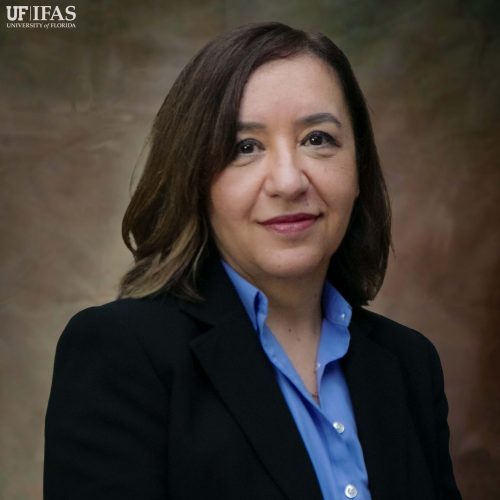Dr. Samira Daroub Ph.D. Soil & Water Scientist. Director, EREC.FL, USA.
Throughout history, women have played a key role in humanity’s scientific advancements. As mentors, innovators and thought leaders, women in science have inspired and empowered countries, communities, women and young girls with their work and knowledge.
In celebration of National Women’s History Month, Samira Daroub shares how a love for learning inspired a lifetime of teaching and research that has expanded beyond United States borders. Daroub is the second woman in 100-year-old history of UF/IFAS Everglades Research & Education Center (EREC) to take the center’s helm.
Q: What was your early life like?
A: I was born in Beirut, Lebanon. My grandfather was a farmer. One of my uncles also had a farm. I always loved math and had a constant desire to learn. I also wanted to attend a university.
My career in soil and water sciences didn’t really take shape until I was an undergraduate. It is all due to the power of teachers and mentoring, and it goes back to my first semester in college when I took a soil science class. The instructor took time to teach each lesson. I learned how it had practical application, and it was through that mentorship and others that I gained a love for this applied science.
That is a life lesson that I took to heart and have paid that support forward ever since. It is my goal to serve as a mentor for every student, rising faculty member or researcher who I encounter throughout my career.
Q: Where did you pursue your undergraduate and graduate degrees and in what fields?
A: I earned a bachelor’s degree in agriculture and a diploma in agricultural engineering from The American University of Beirut in Lebanon. I later obtained my master’s degree in soil sciences there. For my Ph.D. in soil chemistry, I attended Michigan State University on a full scholarship awarded by the non-profit Hariri Foundation-Lebanon.
Q: Tell us about your life at UF/IFAS?
A: I arrived at UF/IFAS in 2000 as an assistant professor of soil and water sciences where I conducted research and taught classes both at EREC and at Fort Lauderdale Research and Education Center. I later became a professor and the distance education coordinator in the department of soil and water sciences.
I have been teaching classes in soil sciences, soil chemistry and environmental nutrient management as part of the undergraduate and graduate distance education programs. I also advise distance education students pursing non-thesis master’s degrees in the environmental science track at UF.
As a researcher, I focus on environmental issues related to soil and water quality. I specialize in the development and implementation of best management practices (BMPs) to reduce phosphorus leaching in soils and ultimately prevent it from entering surface waters in the Everglades in south Florida. A second research focus is on the sustainability of organic soils and agriculture in the Everglades Agricultural Area (EAA). A third focus is on international development aimed on building individual and institutional capacity in India and Middle East in soil health and water resources.
I established a nationally recognized research and Extension program for the development of best management practices to improve water quality as part of a comprehensive effort for Everglades’ restoration in Florida. I offer in-person and online best management practices workshops and have always been committed to providing Extension and outreach activities to local area growers
I later became interim center director of EREC, until February this year when I was appointed as center director.
Q: You have conducted extensive international educational and research work. Tell us about it.
A: My journey in international research and education started when I was a postdoctoral fellow at Michigan State University with Dr. Joe Ritchie. I visited national and international research centers in Colombia, Brazil, Syria, Kenya and Hungary for collaboration and data acquisition to be used in crop modelling.
My international education experiences include teaching and mentoring undergraduate and graduate international students. I have mentored interns, visiting scholars and Borlaug fellows from Brazil, Honduras, Costa Rica, India and Iraq. The scholars were trained for laboratory and research techniques and introduced to sustainable practices in South Florida agriculture and water management. I have conducted research in India, as well as educational projects and capacity building workshops in India, Jordan, Syria, Lebanon and Egypt.
At UF/IFAS, I have always been interested in international research and educational projects to share and gain native knowledge into soil and water management and online learning. I have collaborated with Sandra Russo at the UF International Center on various educational projects in the Middle East. Effective mentoring is a big part of what I do for local and international scholars. I have always taken an approach to advising and mentoring that allows students and postdocs opportunities to strengthen their interpersonal skills and technical competence, while also developing leadership skills and confidence.
Q: What words of inspiration would you give to other women and girls as a mentor and leader in your field?
A: Education is key. Never stop learning. Lean on family, peers, educators and supporters to succeed. A support system is vital.
The mission of the University of Florida Institute of Food and Agricultural Sciences (UF/IFAS) is to develop knowledge relevant to agricultural, human and natural resources and to make that knowledge available to sustain and enhance the quality of human life. With more than a dozen research facilities, 67 county Extension offices, and award-winning students and faculty in the UF College of Agricultural and Life Sciences, UF/IFAS brings science-based solutions to the state’s agricultural and natural resources industries, and all Florida residents. ifas.ufl.edu | @UF_IFAS
source/content : bocaratontribune.com
___________

_________________________
AMERICAN / LEBANON